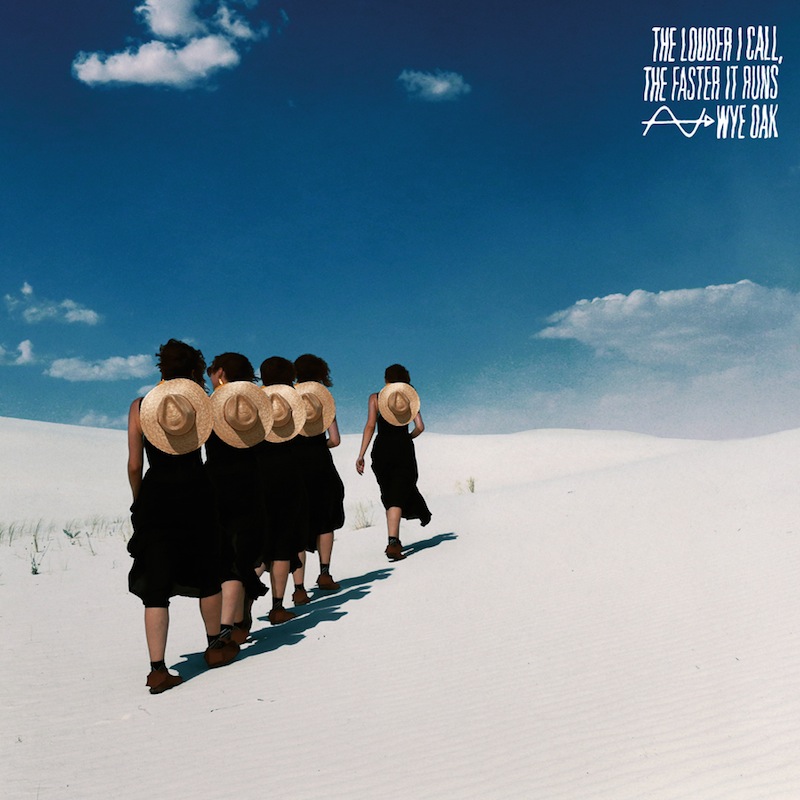Wye Oak : The Louder I Call, The Faster It Runs

It should not be surprising, I suppose, that Wye Oak would regress somewhat from the radical sonic departure of 2014’s Shriek. Prior to that abstract, poppy, synth-heavy record, they’d specialized in a slowcore that sat somewhere halfway between dreary acoustic country music, smeared-lens shoegaze and slight-jangle indie rock. In retrospect, the severity of that departure seems necessary following the slow congealing of their arc: If Children, The Knot, My Neighbor / My Creator and Civilian. This series of increasingly great records nonetheless saw a slow departure away from the more obvious country and folk sounds on their early work. Tween, an interstitial album made up of songs from between the sessions of Civilian and Shriek, perhaps indicated a sonic reconciliation was coming, but the single “Spiral”/”Wave Is Not The Water” indicated, if anything, a deepening rather than a shallowing of those new experimental, rhythm-heavy synthetic textures.
None of which is to say that the record is bad. Far from it; the most notable return is a return to the more conflicted emotionalism of Wasner’s vocals, perhaps just a parallax against the notable return of guitar in the sonic beds, but an effect felt nonetheless. While none of the tracks measure up to the dreary rainy-day power of some of Civilian’s most poignant tracks like the title track or the harrowing “Plains,” there is a renewed sense of grace and comfort within the pain and confusion of growth. Ennui, terror and confusion are present in tracks such as the title track, “Lifer” and “Say Hello,” but they are tempered with a work-mindedness, not quite hope but more a resilience and a trust in both learning and survival to carry one through. Save for the bass- and synth-heavy pre-chorus, late album cut “Over and Over” would not be out of place on Civilian, signaling once more a deeper sense of sonic reconciliation that has since come over the group.
So, in a way, this record answers one of the great lingering questions such a wild turn like Shriek prompted. To make a Radiohead comparison: If Shriek was Wye Oak’s Kid A radical synthetic turn and Tween was their better-than-it-has-any-right-to-be cast-offs re-recorded with new ideas folded in, then that makes The Louder I Call their Hail to the Thief, a sonic comparison which is fitting given that albums similar encyclopedic approach to Radiohead’s sound up to that point, an attempt to make sense of the experiment in the context of the group’s history rather than rendering it a jarring epochal shift. Unfortunately, this comparison is not entirely a positive one; for just as Shriek was benefited by vivacity of that turn and the new-found tricks and sonic touches the group was afforded and Tween showed the potential of a coming sonic reconciliation of sounds, The Louder I Call feels more workmanlike than euphoric or revelatory.
None of the songs are bad and the emotional pacing is handled well. The swooning slide guitar on “You of All People” and the country twang of “Join,” itself soon married to a pleasant bloopy electronic accompaniment, are muted emotionalist moments, too mature to tug directly on your heartstrings while still giving off a whiff of ineffable sadness, like finally accepting that something is lost or that a lesson just won’t be learned. All the instincts are still here. All the performances still feel genuine. All the songs are still moving. Perhaps it’s a symptom of something else. Lacking the rawness of Civilian and the excitement and risk of Shriek, The Louder I Call, The Faster It Runs lacks only that final transcendental element to make it rise above itself. At the end, it almost comes; the sudden rise of the buzzy bass synth pad on the chorus of album closer “I Know It’s Real” against the gentle persistent smiling heartache of Jenn Wasner’s voice feels like the band turning its eye back on the album, moving to give a tremendous emotional climax or some single moment to make it all make sense and give it some greater identity. And, beauty of this moment aside, it’s not quite enough, hindered mostly by the abruptness of the close of the record, denying a fullness to this potent emotional end.
Perhaps they will expand on their catching and gorgeous minimalist experiments showcased on the “Spiral” single. Perhaps the mild shortcomings of this record will be resolved in looking back on this record. It’s just hard not to wish it had some little extra bit more to showcase to those that don’t already know this band and adore their records what they can be at their very best.
Similar Albums:
 Mitski – Puberty 2
Mitski – Puberty 2
 Torres – Three Futures
Torres – Three Futures
 Lucy Dacus – Historian
Lucy Dacus – Historian
Langdon Hickman is listening to progressive rock and death metal. He currently resides in Virginia with his partner and their two pets.

